
INSTRUCTIONAL SCIENCE
Scope & Guideline
Shaping effective teaching strategies for tomorrow's classrooms.
Introduction
Aims and Scopes
- Instructional Design and Educational Technology:
The journal publishes research that explores the design and implementation of instructional technologies and pedagogical strategies, focusing on how these can be effectively integrated into educational practice. - Learning Processes and Outcomes:
Papers often investigate cognitive, emotional, and social processes that influence learning outcomes, including studies on self-regulated learning, motivation, and engagement across diverse learner populations. - Teacher Education and Professional Development:
A significant emphasis is placed on the preparation and ongoing development of educators, examining instructional practices, teacher beliefs, and the impact of training programs on teaching effectiveness. - Diversity and Equity in Education:
Research addressing the needs of diverse learners, including studies on culturally responsive pedagogy, equity in learning opportunities, and the impact of student characteristics on educational outcomes is a core focus. - Collaborative and Inquiry-Based Learning:
The journal promotes research on collaborative learning environments and inquiry-based instructional methods, emphasizing the importance of student interaction and active participation in the learning process.
Trending and Emerging
- Digital Literacy and Online Learning:
With the rise of online education, there is a notable increase in research focused on digital literacy, online instructional strategies, and the effectiveness of technology-enhanced learning environments. - Social and Emotional Learning (SEL):
Research addressing the integration of social and emotional learning into instructional practices is gaining momentum, emphasizing the importance of emotional well-being in educational contexts. - Inquiry-Based and Problem-Based Learning:
There is a significant trend towards research on inquiry-based and problem-based learning approaches, highlighting their effectiveness in promoting critical thinking and real-world problem-solving skills. - Culturally Responsive Teaching:
The focus on culturally responsive pedagogy is becoming increasingly prominent, with studies investigating how educational practices can be adapted to meet the needs of diverse student populations. - Interdisciplinary Approaches to Learning:
Emerging research emphasizes the value of interdisciplinary learning experiences, fostering connections across subjects to enhance student engagement and knowledge retention.
Declining or Waning
- Traditional Assessment Methods:
Research centered on conventional assessment strategies, such as standardized testing and summative assessments, has decreased, with a growing preference for studies exploring formative assessments and alternative evaluation methods. - Content Delivery Models:
There seems to be a reduction in studies focusing solely on traditional content delivery methods, such as lecture-based teaching, as the emphasis shifts towards interactive and student-centered approaches. - Behaviorism in Learning Theories:
The application of behaviorist principles in instructional research appears to be less frequent, as more contemporary cognitive and constructivist theories gain traction in informing educational practices. - General Educational Psychology:
Papers that explore broad psychological principles without direct application to instructional contexts have become less common, suggesting a move towards more targeted educational psychology research that directly informs instructional design. - Single-Discipline Focus:
There is a noticeable decline in research that focuses exclusively on a single discipline without interdisciplinary connections, as the journal increasingly emphasizes the importance of interdisciplinary approaches to education.
Similar Journals

Chemistry Teacher International
Championing Innovative Approaches to Chemistry TeachingChemistry Teacher International is a prominent peer-reviewed journal dedicated to the field of chemistry education, published by WALTER DE GRUYTER GMBH. With its Open Access policy since 2018, this journal ensures that research is widely disseminated to educators, researchers, and practitioners globally. Located in Berlin, Germany, it aims to promote innovative teaching methodologies and practical applications in chemical sciences. The journal has consistently achieved a Q2 ranking in both the Chemistry (Miscellaneous) and Education categories as of 2023, reflecting its relevance and impact within the academic community. Over its converged years from 2019 to 2024, Chemistry Teacher International fosters a collaborative platform for sharing research, insights, and pedagogical strategies, thereby contributing to the advancement of chemistry education on a global scale.
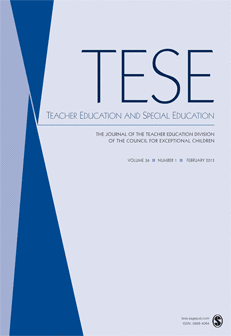
Teacher Education and Special Education
Bridging Theory and Practice in Diverse ClassroomsTeacher Education and Special Education, published by SAGE Publications Inc, stands as a premier journal in the field of education, particularly focusing on the nuances and complexities of teacher education while addressing the needs of special education. With an impressive 2023 impact factor reflected in its Q1 quartile ranking, the journal occupies a vital position in the Scopus Ranks, rated at Rank #112 out of 1543 which places it within the 92nd percentile of its category. The journal publishes high-quality, peer-reviewed research aimed at enhancing educational practices and policy reforms to support diverse learning needs, striving to foster an inclusive educational environment. Although not currently open access, the journal offers a wealth of scholarly articles from 2015 onwards, making it a go-to resource for researchers, educators, and students aiming to stay at the forefront of educational advancements in the United Kingdom and globally. For those engaged in the vital work of teacher training and special education, this journal serves as an indispensable guide and a platform for innovative ideas and evidence-based practices.

ETR&D-EDUCATIONAL TECHNOLOGY RESEARCH AND DEVELOPMENT
Transforming Educational Landscapes with Research InsightsETR&D - Educational Technology Research and Development, published by Springer, is a premier journal dedicated to advancing the field of educational technology through rigorous research and development. With a history dating back to 1957, it has established itself as a leading resource for scholars and practitioners, maintaining a remarkable Q1 ranking in Education as of 2023, and standing at an impressive 41st out of 1543 in the Scopus rankings for Social Sciences - Education, placing it in the 97th percentile. This journal aims to bridge the gap between theory and practice, offering in-depth insights into the latest innovations and methodologies in educational technology. As a vital resource for researchers, educators, and technology developers, ETR&D highlights the interplay of technology, pedagogy, and learning environments, driving the evolution of educational practices in a digital era. Although not an open access journal, it provides comprehensive access options for institutional and individual subscribers, ensuring that key findings reach a broad audience. Discover the future of education through ETR&D's influential publications.

Journal of Baltic Science Education
Shaping the Future of Science Education in the BalticThe Journal of Baltic Science Education, with ISSN 1648-3898, is a leading academic journal published by the SCI METHODICAL CENTRE - SCI EDUCOLOGICA in Lithuania. This esteemed journal, established in 2008, has gained recognition within the educational sector, boasting a notable impact factor that places it in the Q2 category for the year 2023, highlighting its significance in advancing educational research. With Scopus rankings reflecting a commendable placement at #659 out of 1543 in the Education category, the journal serves as a vital platform for disseminating knowledge and fostering discourse among researchers, professionals, and students in the field of science education across the Baltic region and beyond. The journal’s objectives include promoting innovative educational practices, sharing empirical research findings, and contributing to the development of effective science teaching methodologies, ensuring that it remains at the forefront of academic inquiry in education.
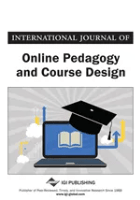
International Journal of Online Pedagogy and Course Design
Transforming online learning experiences.The International Journal of Online Pedagogy and Course Design, published by IGI Global, serves as a vital resource for researchers, educators, and practitioners interested in the integration of technology in education. Since its inception in 2017, this journal has focused on the latest advancements in online teaching methodologies, course design, and assessment frameworks, contributing to the dynamic field of educational technology. It is indexed in Scopus and currently ranks Q4 in the Education category, reflecting its growing influence within the academic community. The journal provides an invaluable platform for sharing innovative research and practical insights that enhance online learning experiences, crucial in today’s digitally-driven educational landscape. With an ISSN of 2155-6873 and E-ISSN of 2155-6881, the journal is dedicated to fostering a collaborative environment where ideas and practices in online pedagogy can thrive.
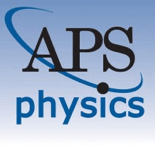
Physical Review Physics Education Research
Unlocking Potential in Physics Learning Environments.Physical Review Physics Education Research, published by the American Physical Society, stands at the forefront of educational research in the realm of physics. With an impact factor reflective of its esteemed scholarly contributions, this Open Access journal has made significant strides since its inception in 2016, promoting accessible high-quality research. It is recognized in the Q1 category in both Education and Physics and Astronomy for 2023, emphasizing its dual relevance across these vital disciplines. The journal serves as a critical platform for researchers, educators, and students alike, publishing comprehensive studies and innovative methodologies that enhance physics education. Its rankings within Scopus further affirm its dedication to advancing knowledge within the academic community, making it an indispensable resource for individuals committed to enhancing student understanding and engagement in the physical sciences. Located in the United States, the journal is dedicated to fostering a collaborative environment that encourages the dissemination of relevant findings and contemporary teaching practices.
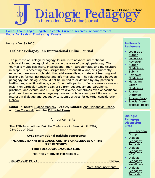
Dialogic Pedagogy
Connecting Voices for Educational Transformation.Dialogic Pedagogy is an esteemed open-access journal published by the University of Pittsburgh, University Library System, focusing on innovative and transformative approaches in education and linguistics. Since its inception in 2013, the journal has gained recognition for its commitment to fostering dialogic practices that enhance learning and communication across diverse educational contexts. With an impressive impact in the fields of education and language, it has achieved a Q2 ranking in Linguistics and Language and a Q3 ranking in Education as of 2023, illustrating its relevance and contribution to ongoing scholarly discourse. The journal’s notable Scopus rankings further highlight its influence, placing it in the 77th and 74th percentiles in the respective categories of Arts and Humanities and Social Sciences. Operating from the heart of the United States, the journal serves as a vital platform for researchers, educators, and students aiming to explore and implement dialogic pedagogical methods. With its open-access model, Dialogic Pedagogy ensures that valuable insights and research findings are readily available to a global audience, encouraging collaboration and further inquiry in this dynamic intersection of education and linguistics.
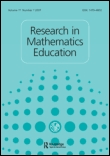
Research in Mathematics Education
Advancing the Future of Mathematics EducationResearch in Mathematics Education is a premier academic journal published by Routledge Journals, Taylor & Francis Ltd, focusing on the critical field of mathematics education. Established in 1998, this journal has earned a reputation for fostering innovative scholarship and research that advances the understanding of teaching and learning mathematics. With its impressive Q2 ranking in both Education and Mathematics (miscellaneous) categories for 2023, and a notable Scopus rank of 60th in General Mathematics, it serves as a vital resource for researchers, educators, and policymakers alike. While it does not offer Open Access, the journal’s rigorous peer-reviewed framework ensures that only high-quality articles are published, contributing significantly to both theoretical and applied aspects of mathematics education. Its commitment to excellence is reflected in its ongoing aim to disseminate impactful research, making it an indispensable resource in the academic and educational communities.
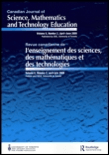
Canadian Journal of Science Mathematics and Technology Education
Advancing STEM Education Through Innovative ResearchCanadian Journal of Science Mathematics and Technology Education (ISSN: 1492-6156; E-ISSN: 1942-4051) is a prominent publication by SPRINGER based in Switzerland, dedicated to exploring innovative methodologies and practices in the fields of science, mathematics, and technology education. Established in 2001 and continuing to 2024, the journal maintains a strong reputation within the academic community, reflected in its Q2 ranking in the Education category for 2023 and a commendable Scopus ranking that places it in the top 25% of journals within the social sciences education domain (Rank #383/1543). This journal serves as a critical platform for researchers, educators, and practitioners interested in the latest developments, research findings, and discussions pertaining to instructional strategies and curricular advancements. Although it is not open access, the journal's insights and contributions are invaluable for those aiming to elevate educational practices and address contemporary challenges in STEM education.
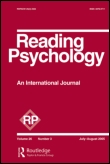
Reading Psychology
Exploring the Intersection of Reading and MindReading Psychology, published by Routledge Journals, Taylor & Francis Ltd, is an esteemed journal dedicated to exploring the multifaceted relationship between reading processes and psychological principles. Since its establishment in 1979, this journal has provided a crucial platform for researchers, educators, and psychologists, addressing pivotal themes in Developmental and Educational Psychology, Education, and Linguistics and Language. With a commendable impact factor and a robust ranking within Scopus across multiple categories, including Q1 in Linguistics and Language, Reading Psychology plays an indispensable role in advancing scholarly discourse. Although it currently does not provide Open Access options, it remains a vital source of innovative research that informs theory and practice. The journal aims to cultivate a deeper understanding of reading behaviors, foster interdisciplinary collaboration, and ultimately enhance educational techniques, making it essential reading for anyone committed to the study of reading and cognition.